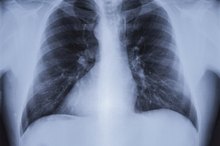Expectorant Vs. Decongestant
If you feel overwhelmed as you stand in front of the huge variety of cough and cold medications in your local drugstore, you’re not alone 3. It’s difficult to choose from among the many different types of medications and long chemical names, especially if you are sick or must make choices for your child. A better understanding of two of the most common types of medication will help eliminate some of those hard choices.
If you are experiencing serious medical symptoms, seek emergency treatment immediately.
Expectorants
An expectorant is any medication that causes mucus and phlegm to come up from the lungs, bronchi, and trachea 3. Expectorants are also called mucolytic agents. A commonly used expectorant is guaifenesin, which is available over-the-counter or by prescription and can be taken in capsule, tablet, or liquid form.
Decongestants
The Differences Between Mucinex & Sudafed
Learn More
Decongestants are drugs that shrink swollen membranes in the nose, making it easier to breath. They can be taken orally or sprayed in the nose, but the nose sprays should not be used for more than five days without consulting a doctor. Using a nasal spray for longer than five days causes a rebound effect, which means that your symptoms will actually be worse once you stop using the spray. Decongestant eye drops are also available to relieve itchy eyes.
- Decongestants are drugs that shrink swollen membranes in the nose, making it easier to breath.
- They can be taken orally or sprayed in the nose, but the nose sprays should not be used for more than five days without consulting a doctor.
Action
Expectorants work by breaking the bonds between mucoproteins that create the thickness—or viscosity—of mucus in the lungs. This helps to increase the flow of the mucus and makes it easier to remove from the body through coughing. Decongestants act by causing the blood vessels in the nose and sinuses to constrict. This action reduces inflammation and mucus formation.
- Expectorants work by breaking the bonds between mucoproteins that create the thickness—or viscosity—of mucus in the lungs.
- Decongestants act by causing the blood vessels in the nose and sinuses to constrict.
Factors
The Best Allergy Medicine for High Blood Pressure
Learn More
The key is to target your specific symptoms and buy only the medication for those symptoms rather than a “one size fits all” medication that treats everything 3. If you have a productive cough, meaning that some mucus comes up during the cough, or if you have congestion in your chest, then an expectorant will help. If you have a stuffy nose, then consider a decongestant. However, a runny, itchy nose without congestion will not be helped by a decongestant.
If your symptoms are not severe enough to interfere with sleep or daily functioning, consider skipping medications and instead opt for old-fashioned fluids, chicken noodle soup, and extra rest. Don’t worry about brand names or even the actual name of the active ingredients. Make it easier by simply paying attention to the major categories of ingredients (e.g., expectorant, decongestant, antihistamine, and cough suppressant) listed on the front. You can use more than one medication as long as the categories of ingredients do not overlap.
- The key is to target your specific symptoms and buy only the medication for those symptoms rather than a “one size fits all” medication that treats everything 3.
- If your symptoms are not severe enough to interfere with sleep or daily functioning, consider skipping medications and instead opt for old-fashioned fluids, chicken noodle soup, and extra rest.
Warnings
If you have high blood pressure you should not use a decongestant without first consulting a physician. If the medication you choose also includes a pain reliever such as acetaminophen, do not take more of the pain reliever or you may risk exceeding the maximum dosage.
Related Articles
References
- Cold and Cough Medication Guide
- Michigan Medicine, University of Michigan. Relieving a Cough. Updated September 5, 2018.
- Wark P. Bronchitis (acute). BMJ Clin Evid. 2015;2015:1508.
- Smith SM, Schroeder K, Fahey T. Over-the-counter (OTC) medications for acute cough in children and adults in community settings. Cochrane Database Syst Rev. 2014;(11):CD001831. doi:10.1002/14651858.CD001831.pub5
- MedlinePlus. Guaifenesin. Updated February 18, 2020.
- MedlinePlus. Dextromethorphan. Updated February 18, 2020.
- American Academy of Family Physicians. OTC Cough and Cold Medicines and My Child. Updated May 22, 2019.
- American Academy of Family Physicians: familydoctor.org. Cough medicine: Understanding your OTC options. Updated April 22, 2019.
Writer Bio
Sandi Busch received a Bachelor of Arts in psychology, then pursued training in nursing and nutrition. She taught families to plan and prepare special diets, worked as a therapeutic support specialist, and now writes about her favorite topics – nutrition, food, families and parenting – for hospitals and trade magazines.









